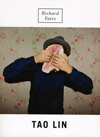Richard Yates
With his first novel Eeeee Eee Eeee, I encountered the spine-tingling creature known as the “contemporary writer” – contemporary in both the sense of writing now and writing at an age close to my own. After coming to terms with Lin’s persona (an unfortunate combination of reading the back cover of books and the Internet), fiction diverged from my ideas of authorship and the dead white guys who’ve historically run the show.
With his first novel Eeeee Eee Eeee, I encountered the spine-tingling creature known as the “contemporary writer” – contemporary in both the sense of writing now and writing at an age close to my own. After coming to terms with Lin’s persona (an unfortunate combination of reading the back cover of books and the Internet), fiction diverged from my ideas of authorship and the dead white guys who’ve historically run the show.
Short version of that story: I liked the book; it struck me in a way tales of articulate prostitutes in 18th century France could not. Even though many critics have derided Lin for writing in an inane, juvenile and inanely juvenile style, the questions of permanence and lasting artistic worth continued needling the part of my brain habitually evaluating such considerations. His second novel, Richard Yates, will not escape similar accusations by the unfeeling masses of established, literary thought, whose viscous arterial fluid has seemed to have stiffened to the point that locomotion is just possible, but alteration and innovation of direction remains a burden too taxing. Who really gets these damn kids anyway?
Richard Yates charts the relationship of Haley Joel Osment and Dakota Fanning. The former works at a library in NYC for the necessities and publishes fiction because of necessity of expression; he has the compulsion at 22 years-old. His girlfriend, Fanning, is a student and sporadically employed, menial laborer from New Jersey; and six years Osment’s junior. At sixteen, she lives with her mother in the fashion most popular with teenagers. This age disparity, while in vogue once among cafeteria philosophers for its systematically arbitrary distinctions of birthdates and numbers, seems oddly unimportant throughout the story, except when an outside force – the mother, for instance, or a sudden surge in brain chemistry – pops up. (And yes, the age of consent in New York State is seventeen, so the occasions of sex are illegal according to the bevy of informative results on Google.)
They met online and most of their communication occurs on Gmail chat, if they’re seeking real time interactivity; via email, for more thought-out discourse; or text message, capturing that long-distance-relationship-on-the-go feel. In Lin’s emblematic style – only imperfectly described as declarative minimalism – the two threaten one another in the playfully hyperbolic argot of sarcasm with which the Internet generation communicates.
“Where’s your mom,” said Haley Joel Osment.
“She’s watching TV. She thinks I’m researching college shit. I think I’m fucked for college. I don’t know where to go. And I only have an 1100 on my SATs.”
“Don’t worry about that. You’re committing suicide this year probably.”
When financially possible, one or the other makes the two-hour trip by train, but very little transpires in the traditional sense of “meaningful action.” Speaking to one another, the book details their back-and-forth of protestations of boredom, anger and sadness – usually in flat declaratives such as, “I felt stupid,” or “I think obese people are assholes, they take up more room.” These dialogues generally happen during dinner at a Chinese restaurant, while stealing organically sensible foodstuffs, or walking nowhere with their earbuds snugly in place. There is much dissonance between the action/speech/thought patterns, interplaying broody self-deprecation and doubt, the importunate material desires of youth, and the wanton emotional fluctuations of romantic involvement.
But this constant drone of intelligible or less than intelligible improvisational dialogue encapsulates Lin’s poignancy. The story of Osment and Fanning’s tabooed love could easily have been written by a Flaubert or de Maupassant, but Lin manages it without the Rococo prose and traditional structure. Each outburst of irreverence, be it Osment’s penchant for hamster metaphors or Fanning’s faux(?) self-violent declarations, eradicates literary contrivance and in its place erects a monument of modern hyper-realism.
This confinement rectifies the lack of authorial fine-tuning in reality with the unnatural act of writing. The bon mot does not exist in Richard Yates, and if it does appear, it’s the result of chance concurrence between the unconscious and talking to talk – both products of a compulsion for sympathy seeking and mutual understanding between cerebrally isolated beings.
The actuality of alienation underlies their peregrinations of speech and action. When the two lovers struggle to understand one another, they do so wistfully but truthfully, relegating passionate subtlety for verisimilitude. This truth-seeming resonates for anyone whose prose sensibility has been rattled by the histrionics of Anna Karenina or the machismo of Hemingway. Lin absorbs the commonplaces of everyday life and creates pure products of this actuality, but luckily – and this is where Richard Yates rises above its predecessors – does so while tackling social deviations beyond those categorized as infantile and superficial.
In Shoplifting from American Apparel, there is a similar unity between style and Zeitgeist. The novella, Lin’s previous, was equally open to concerns of self-irony taken too far. Could it be criticized without a loophole already existing within the minimal material within? Richard Yates escapes this tendency by dealing with a contentious subject without denouncing the stylistic innovations so necessary to Lin’s artistic expression. Dakota Fanning is sixteen years-old. Her mother, initially, freaks out upon catching them together, though her type of “freaking” involves a depressing phone call concerning “intentions” and Osment’s depressive, self-destructive tendencies in life and in Literature. Ultimately, something grand is being explored in a way, lasting or not, that merits the few hours and puzzled expressions to read it.





